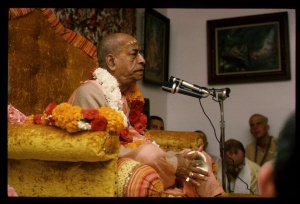CC Antya 5.80 (1975): Difference between revisions
(Vanibot #0027: CCMirror - Mirror CC's 1996 edition to form a basis for 1975) |
(Vanibot #0020: VersionCompareLinker - added a link to the Version Compare feature) |
||
| Line 2: | Line 2: | ||
<div style="float:left">'''[[Sri Caitanya-caritamrta (1975)|Śrī Caitanya-caritāmṛta (1975)]] - [[CC Antya (1975)|Antya-līlā]] - [[CC Antya 5 (1975)|Chapter 5: How Pradyumna Miśra Received Instructions from Rāmānanda Rāya]]'''</div> | <div style="float:left">'''[[Sri Caitanya-caritamrta (1975)|Śrī Caitanya-caritāmṛta (1975)]] - [[CC Antya (1975)|Antya-līlā]] - [[CC Antya 5 (1975)|Chapter 5: How Pradyumna Miśra Received Instructions from Rāmānanda Rāya]]'''</div> | ||
<div style="float:right">[[File:Go-previous.png|link=CC Antya 5.79 (1975)|Antya-līlā 5.79]] '''[[CC Antya 5.79 (1975)|Antya-līlā 5.79]] - [[CC Antya 5.81 (1975)|Antya-līlā 5.81]]''' [[File:Go-next.png|link=CC Antya 5.81 (1975)|Antya-līlā 5.81]]</div> | <div style="float:right">[[File:Go-previous.png|link=CC Antya 5.79 (1975)|Antya-līlā 5.79]] '''[[CC Antya 5.79 (1975)|Antya-līlā 5.79]] - [[CC Antya 5.81 (1975)|Antya-līlā 5.81]]''' [[File:Go-next.png|link=CC Antya 5.81 (1975)|Antya-līlā 5.81]]</div> | ||
{{CompareVersions|CC|Antya 5.80|CC 1975|CC 1996}} | |||
{{RandomImage}} | {{RandomImage}} | ||
==== TEXT 80 ==== | ==== TEXT 80 ==== | ||
<div class="verse"> | <div class="verse"> | ||
: | :'gṛhastha' hañā nahe rāya ṣaḍ-vargera vaśe | ||
: | :'viṣayī' hañā sannyāsīre upadeśe | ||
</div> | </div> | ||
| Line 18: | Line 17: | ||
<div class="synonyms"> | <div class="synonyms"> | ||
gṛhastha hañā—being a householder; nahe—is not; rāya—Rāmānanda Rāya; ṣaṭ-vargera vaśe—under the control of the six kinds of bodily | gṛhastha hañā—being a householder; nahe—is not; rāya—Rāmānanda Rāya; ṣaṭ-vargera vaśe—under the control of the six kinds of bodily change; viṣayī hañā—being a pounds-and-shillings man; sannyāsīre upadeśe—advises persons in the renounced order of life. | ||
</div> | </div> | ||
| Line 25: | Line 24: | ||
<div class="translation"> | <div class="translation"> | ||
Although Rāmānanda Rāya was a householder, he was not under the control of the six kinds of bodily | Although Rāmānanda Rāya was a householder, he was not under the control of the six kinds of bodily change. Although apparently a pounds-and-shillings man, he advised even persons in the renounced order. | ||
</div> | </div> | ||
| Line 32: | Line 31: | ||
<div class="purport"> | <div class="purport"> | ||
Śrī Rāmānanda Rāya externally appeared to be a gṛhastha who was under the influence of the external, material energy, not a self-controlled brahmacārī, vānaprastha or sannyāsī. Gṛhasthas (householders) who are under the influence of the external energy accept householder life for the purpose of sense enjoyment, but a transcendentally situated Vaiṣṇava is not subjected to the influence of the senses by the | Śrī Rāmānanda Rāya externally appeared to be a gṛhastha who was under the influence of the external, material energy, not a self-controlled brahmacārī, vānaprastha or sannyāsī. Gṛhasthas (householders) who are under the influence of the external energy accept householder life for the purpose of sense enjoyment, but a transcendentally situated Vaiṣṇava is not subjected to the influence of the senses by the Lord's material rule of the six kinds of bodily change (kāma, krodha, lobha, moha, mada, and mātsarya), even when he plays the part of a gṛhastha. Thus although Śrīla Rāmānanda Rāya acted as a gṛhastha and was accepted as an ordinary pounds-and-shillings man, he was always absorbed in the transcendental pastimes of Lord Kṛṣṇa. Therefore his mind was spiritually situated, and he was interested only in the subject of Kṛṣṇa. Rāmānanda Rāya was not among the Māyāvādī impersonalists or materialistic logicians who are opposed to the principles of Lord Kṛṣṇa's transcendental pastimes. He was already spiritually situated in the order of renounced life; therefore he was able to turn sand into gold by spiritual potency, or, in other words, to elevate a person from a material to a spiritual position. | ||
</div> | </div> | ||
Latest revision as of 02:42, 27 January 2020

A.C. Bhaktivedanta Swami Prabhupada
TEXT 80
- 'gṛhastha' hañā nahe rāya ṣaḍ-vargera vaśe
- 'viṣayī' hañā sannyāsīre upadeśe
SYNONYMS
gṛhastha hañā—being a householder; nahe—is not; rāya—Rāmānanda Rāya; ṣaṭ-vargera vaśe—under the control of the six kinds of bodily change; viṣayī hañā—being a pounds-and-shillings man; sannyāsīre upadeśe—advises persons in the renounced order of life.
TRANSLATION
Although Rāmānanda Rāya was a householder, he was not under the control of the six kinds of bodily change. Although apparently a pounds-and-shillings man, he advised even persons in the renounced order.
PURPORT
Śrī Rāmānanda Rāya externally appeared to be a gṛhastha who was under the influence of the external, material energy, not a self-controlled brahmacārī, vānaprastha or sannyāsī. Gṛhasthas (householders) who are under the influence of the external energy accept householder life for the purpose of sense enjoyment, but a transcendentally situated Vaiṣṇava is not subjected to the influence of the senses by the Lord's material rule of the six kinds of bodily change (kāma, krodha, lobha, moha, mada, and mātsarya), even when he plays the part of a gṛhastha. Thus although Śrīla Rāmānanda Rāya acted as a gṛhastha and was accepted as an ordinary pounds-and-shillings man, he was always absorbed in the transcendental pastimes of Lord Kṛṣṇa. Therefore his mind was spiritually situated, and he was interested only in the subject of Kṛṣṇa. Rāmānanda Rāya was not among the Māyāvādī impersonalists or materialistic logicians who are opposed to the principles of Lord Kṛṣṇa's transcendental pastimes. He was already spiritually situated in the order of renounced life; therefore he was able to turn sand into gold by spiritual potency, or, in other words, to elevate a person from a material to a spiritual position.